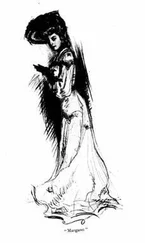James Cabell - The Rivet in Grandfather's Neck. A Comedy of Limitations
Здесь есть возможность читать онлайн «James Cabell - The Rivet in Grandfather's Neck. A Comedy of Limitations» весь текст электронной книги совершенно бесплатно (целиком полную версию без сокращений). В некоторых случаях можно слушать аудио, скачать через торрент в формате fb2 и присутствует краткое содержание. Жанр: Фэнтези, на английском языке. Описание произведения, (предисловие) а так же отзывы посетителей доступны на портале библиотеки ЛибКат.
- Название:The Rivet in Grandfather's Neck. A Comedy of Limitations
- Автор:
- Жанр:
- Год:неизвестен
- ISBN:нет данных
- Рейтинг книги:3 / 5. Голосов: 1
-
Избранное:Добавить в избранное
- Отзывы:
-
Ваша оценка:
- 60
- 1
- 2
- 3
- 4
- 5
The Rivet in Grandfather's Neck. A Comedy of Limitations: краткое содержание, описание и аннотация
Предлагаем к чтению аннотацию, описание, краткое содержание или предисловие (зависит от того, что написал сам автор книги «The Rivet in Grandfather's Neck. A Comedy of Limitations»). Если вы не нашли необходимую информацию о книге — напишите в комментариях, мы постараемся отыскать её.
The Rivet in Grandfather's Neck. A Comedy of Limitations — читать онлайн бесплатно полную книгу (весь текст) целиком
Ниже представлен текст книги, разбитый по страницам. Система сохранения места последней прочитанной страницы, позволяет с удобством читать онлайн бесплатно книгу «The Rivet in Grandfather's Neck. A Comedy of Limitations», без необходимости каждый раз заново искать на чём Вы остановились. Поставьте закладку, и сможете в любой момент перейти на страницу, на которой закончили чтение.
Интервал:
Закладка:
She waited there until the maid returned; and registered to the woman's credit the discreet soft closing of the front-door and afterward the well-nigh inaudible swish of the rear door of the dining-room as the maid went back into the kitchen.
"In any event," Patricia largely conceded, "she probably doesn't clash the knives and forks in the pantry after supper, like she was hostile armaments with any number of cutlasses apiece. I remember Rudolph simply couldn't stand it when we had Ethel."
So much was satisfactory. Only—her parlor was so altered!
There was—to give you just her instantaneous first impression—so little in it. Broad spaces of plain color showed everywhere; and Patricia's ideal of what a parlor should be, as befitted the châtelaine of a fine home in Lichfield, had always been the tangled elegancies of the front show-window of a Woman's Exchange for Fancy Work. The room had even been repapered—odiously, as she considered; and the shiny floor of it boasted just three inefficient rugs, like dingy rafts upon a sea of very strong coffee.
Patricia looked in vain for her grandiose plush-covered chairs, her immaculate "tidies," and the proud yellow lambrequin, embroidered in high relief with white gardenias, which had formerly adorned the mantelpiece. The heart of her hungered for her unforgotten and unforgettable "watered-silk" papering wherein white roses bloomed exuberantly against a yellow background—which deplorably faded if you did not keep the window-shades down, she remembered—and she wanted back her white thick comfortable carpet which hid the floor completely, so that everywhere you trod upon the buxomest of stalwart yellow roses, each bunch of which was lavishly tied with wind-blown ribbons.
Then, too, her cherished spinning-wheel, at least two hundred and fifty years old, which had looked so pretty after she had gilded it and added a knot of pink sarsenet, was departed; and gone as well was the mirror-topped table, with its array of china swan and frogs and water-lilies artistically grouped about its speckless surface. Even her prized engraving of "Michael Angelo Buonarotti"—contentedly regarding his just finished Moses, while a pope tiptoed into the room through a side-door—had been removed, with all its splendors of red-plush and intricate gilt-framing.
Just here and there, in fine, like a familiar face in a crowd, she could discover some one of her more sedately-colored "parlor ornaments"; and the whole history of it—its donor or else its price, the gestures of the shopman, even what sort of weather it was when she and Rudolph found "exactly what I've been looking for" in the shop-window, and the Stapyltonian, haggling over the price with which Patricia had bargained—such unimportant details as these now vividly awakened in recollection…. In fine, this room was not her parlor at all, and in it Patricia was lonely…. Yes, yes, she would be nowadays, the colonel reflected, for he himself had never been in thorough sympathy with all the changes made by Roger's self-assured young wife.
Thus it was with the first floor of the house, through which Patricia strayed with uniform discomfort. This place was home no longer.
Thus it was with the first floor of the house. Everywhere the equipments were strange, or at best arranged not quite as Patricia would have placed them. Yet they had not any look of being recently purchased. Even that hideous stair-carpet was a little worn, she noted, as noiselessly she mounted to the second story.
The house was perfectly quiet, save for a tiny shrill continuance of melody that somehow seemed only to pierce the silence, not to dispel it. Rudolph—of all things!—had in her absence acquired a canary. And everybody knew what an interminable nuisance a canary was.
She entered the front room. It had been her bedroom ever since her marriage. She remembered this as with a gush of defiant joy.
III
So it seemed to Rudolph Musgrave that Patricia came actually into the room that had been hers….
A canary was singing there, very sweet and shrill and as in defiant joy. Its trilling seemed to fill the room. In the brief pauses of his song the old clock, from which Rudolph had removed the pendulum on the night of Agatha's death would interpose an obstinate slow ticking; and immediately the clock-noise would be drowned in melody. Otherwise the room was silent.
In the alcove stood the bed which had been Patricia's. Intent upon its occupant were three persons, with their backs turned to her. One Patricia could easily divine to be a doctor; he was twiddling a hypodermic syringe between his fingers, and the set of his shoulders was that of acquiescence. Profiles of the others she saw: one a passive nurse in uniform, who was patiently chafing the right hand of the bed's occupant; the other a lean-featured red-haired stranger, who sat crouched in his chair and held the dying man's left hand.
For in the bed, supported by many pillows, and facing Patricia, was a dying man. He was very old, having thick tumbled hair which, like his two-weeks' beard, was uniformly white. His eyelids drooped a trifle, so that he seemed to meditate concerning something ineffably remote and serious, yet not, upon the whole, unsatisfactory. You saw and heard the intake of each breath, so painfully drawn, and expelled with manifest relief, as if the man were very tired of breathing. Yet the bedclothes heaved with his vain efforts just to keep on breathing. And sometimes his parted lips would twitch curiously…. Rudolph Musgrave, too, could see all this quite plainly, in the mirror over the mantel.
The doctor spoke. "Yes—it's the end, Professor Musgrave," he said. For this lean-featured red-haired stranger to whom the doctor spoke, a pedagogue to his finger-tips, had once been Patricia's dearly-purchased, chubby baby Roger.
And Rudolph Musgrave stayed motionless. He knew Patricia was there; but that fact no longer seemed either very strange or even unnatural; and besides, it was against some law for him to look at her until Patricia had called him…. Meanwhile, just opposite, above the mirror, and facing him, was the Stuart portrait of young Gerald Musgrave. This picture had now hung there for a great many years. The boy still smiled at you in undiminished raillery, even though he smiled ambiguously, and with a sort of humorous sadness in his eyes. Once, very long ago—when the picture hung downstairs—some one had said that Gerald Musgrave's life was barren. The dying man could not now recollect, quite, who that person was.
Rudolph Musgrave stayed motionless. He comprehended that he was dying. The greatest of all changes was at hand; and he, who had always shrunk from making changes, was now content enough…. Indeed, with Rudolph Musgrave living had always been a vaguely dissatisfactory business, a hand-to-mouth proceeding which he had scrambled through, as he saw now, without any worthy aim or even any intelligible purpose. He had nothing very heinous with which to reproach himself; but upon the other side, he had most certainly nothing of which to be particularly proud.
So this was all that living came to! You heard of other people being rapt by splendid sins and splendid virtues, and you anticipated that to-morrow some such majestic energy would transfigure your own living, and change everything: but the great adventure never arrived, somehow; and the days were frittered away piecemeal, what with eating your dinner, and taking a wholesome walk, and checking up your bank account, and dovetailing scraps of parish registers and land-patents and county records into an irrefutable pedigree, and seeing that your clothes were pressed, and looking over the newspapers—and what with other infinitesimal avocations, each one innocent, none of any particular importance, and each consuming an irrevocable moment of the allotted time—until at last you found that living had not, necessarily, any climax at all…. And Patricia would call him presently.
Читать дальшеИнтервал:
Закладка:
Похожие книги на «The Rivet in Grandfather's Neck. A Comedy of Limitations»
Представляем Вашему вниманию похожие книги на «The Rivet in Grandfather's Neck. A Comedy of Limitations» списком для выбора. Мы отобрали схожую по названию и смыслу литературу в надежде предоставить читателям больше вариантов отыскать новые, интересные, ещё непрочитанные произведения.
Обсуждение, отзывы о книге «The Rivet in Grandfather's Neck. A Comedy of Limitations» и просто собственные мнения читателей. Оставьте ваши комментарии, напишите, что Вы думаете о произведении, его смысле или главных героях. Укажите что конкретно понравилось, а что нет, и почему Вы так считаете.



